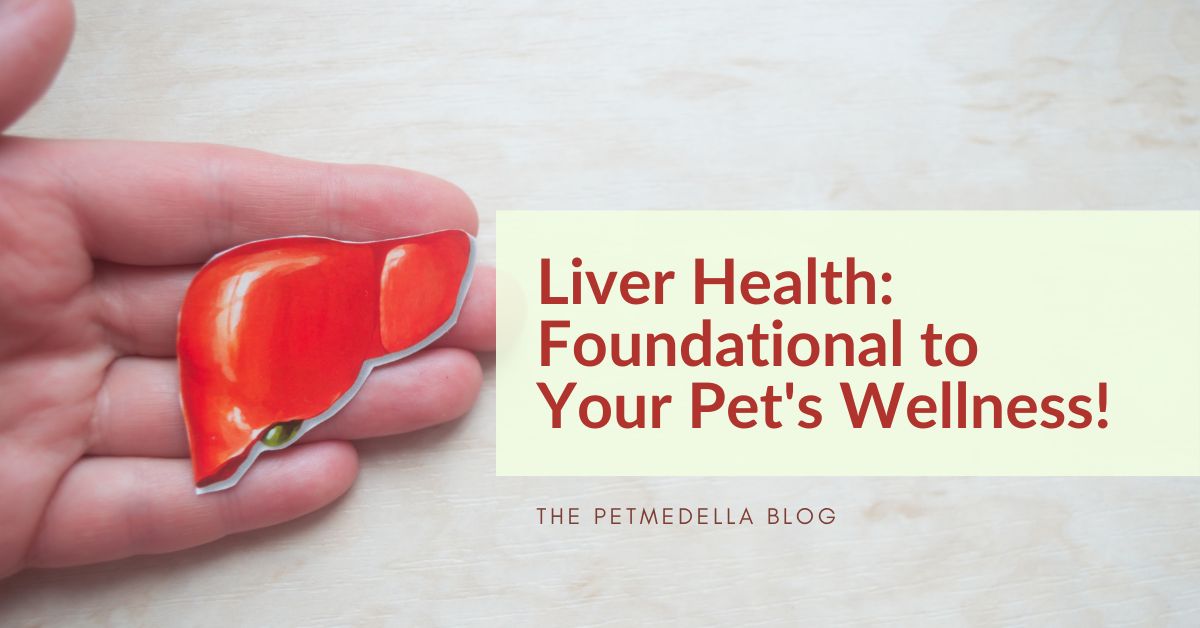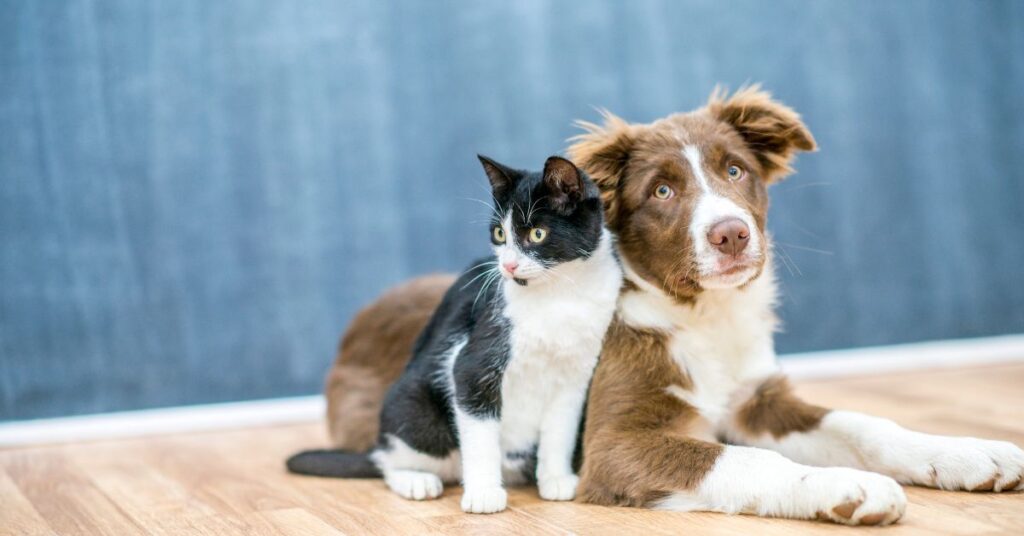
Liver health should be one of the foundations of your pet health routine.
The liver is arguable the most important organ, besides the heart and brain, for your pet! It maintains your pet’s overall health and wellness and is connected to almost every organ system in the body. The liver is responsible for detoxification, metabolism, digestion, and storage of nutrients. Just like in humans, a healthy liver is essential for pets to thrive and lead a happy life.
When the liver is functioning optimally, it helps remove toxins from the body, aids in the digestion of fats, and supports the immune system. However, when the liver becomes compromised, or stagnant as Traditional Chinese Medicine and holistic health practitioners say, it can lead to imbalances in the body and affect your pet’s quality of life.
In this post, we’ll cover:
- The functions of the liver that support liver health
- Signs of liver dysfunction and poor liver health in your pet
- The impact of lifestyle on your pet’s liver health
- Tips for maintaining a healthy liver through diet and nutrition
- Incorporating every day liver detoxification practices for your pet
- Keep ’em active for liver health!
- Natural supplements and herbs that support liver health
Prioritize liver health for your pet, and they will live a more balanced and vibrant life.
The Functions of the Liver that support Liver Health
To truly appreciate the importance of liver health, it is crucial to understand the functions it performs. It’s also important to think of the systems it’s linked to, namely the digestive system, and the endocrine system. The liver acts as a detoxification center, with 2 phases of detoxification. It’s like a filter, removing harmful substances from our bloodstream. It also plays a key role in breaking down fats and cholesterol balance, both of which are essential for various bodily functions.
Additionally, the liver produces bile, which gets stored in the gallbladder, and aids in the digestion and absorption of fats.
The liver also stores iron and copper. It plays a role in blood clotting and in the manufacturing of proteins. The liver plays a role in heme breakdown which produce the breakdown products biliverdin and bilirubin (1).
Without a properly functioning liver, your pet would struggle to eliminate toxins, digest food, and absorb essential nutrients.
Signs of liver dysfunction and poor liver health
There are several common medical liver health issues that can affect our beloved pets. One such condition is liver disease, which can be caused by various factors such as infection, toxins, medications, or genetics. Liver disease can manifest in different forms, including hepatitis, cirrhosis, or fatty liver disease.
Another common issue is liver shunts, which are abnormal blood vessels that divert blood flow away from the liver. This can lead to a buildup of toxins in the bloodstream and cause a range of symptoms. Additionally, liver tumors can also occur in pets, which may be benign or malignant and can impact liver function.
It is important to consult a licensed veterinary care professional if you suspect any health condition in your pet.
Other, more subtle signs of liver issues fall into the term we use, which is liver STRESS. We can also look at this as liver stagnation. Stagnation means the lack of flow, or blocked movement. This is in the context of Traditional Chinese Medicine, and stagnation.
When we see liver stress on a Full Bioenergetic Scan, we look to nutrient imbalances, digestive imbalances and most importantly, toxins.

The impact of lifestyle on liver health for your pet
A less than optimal diet, second hand smoke, and lack of exercise can all play a role in your cat or dog’s liver health.
- Added saturated fat, and added sugars, puts a strain on the liver, leading to inflammation and fatty liver disease. That means no bacon for Rufus!
- Did you know that secondhand smoke can increase the resonating toxin and heavy metal cadmium? This metal is a common resonating toxin for pets who live with smokers.
- The simple act of engaging your pet in regular physical activity promotes liver health by reducing inflammation, decreasing the toxin burden, and improving overall blood circulation!
Many holistic health practitioners for pets discuss the impact of medications on the liver. Yet, sometimes medications are necessary for your pet. You can minimize the impact that these can have on your pet’s liver, by turning to supportive herbs for liver health and liver detox. We’ll cover that shortly!
Tips for maintaining a liver health
We mentioned an overall healthy diet for liver health. Having a generally healthy diet keeps your pet’s body resilient during times of stress, and the occasional piece of bacon dropped on the floor! Ensure that your pet’s food contains high-quality proteins, healthy fats, and adequate amounts of vitamins and minerals.
Avoid feeding your pet excessive amounts of fatty or processed foods. Besides minimizing any strain on the liver, you are minimizing strain on other systems, like the digestive system.
Incorporating foods that promote liver detoxification and support its function can significantly improve your pet’s overall wellness. Don’t be afraid to include pet safe fruits and vegetables in your pet’s meals. Berries, leafy greens, and cruciferous vegetables like broccoli and cauliflower can be eaten by your dog. Cats, on the other hand, are obligate carnivores and may turn their nose up at a piece of broccoli!
These antioxidant foods help protect the liver cells from oxidative stress. Biologically and species appropriate fresh foods promote healthy digestion and prevent the buildup of toxins in the liver. By promoting good digestion, and elimination through the bowel, and kidney is called Phase 3 of detoxification.
Are you a holistic health practitioner? Learn more about creating balanced health for pets and people through
bioenergetic testing by becoming an affiliate and using our testing!
What about liver detox in your pet’s everyday wellness routine?
Liver health through everyday practices can help support the liver’s natural detoxification processes and promote its overall health. One popular way to support your liver is to incorporate liver-supporting herbs and supplements into your wellness routine. Milk thistle, dandelion root, and turmeric are some examples of herbs that have been traditionally used for liver health.
These herbs contain compounds that help protect the liver from damage and promote its regeneration.
Milk thistle has been extensively studied for its hepatoprotective properties. It contains a compound called silymarin, which has antioxidant and anti-inflammatory effects on the liver. It’s very safe for pets, and often is used for our Pet Scan Clients! Artichoke leaf extract also has shown promise in promoting liver health.
However, it is crucial to consult with a healthcare professional before starting any supplements to ensure they are appropriate for your individual needs. We require a full health questionnaire from everyone we run testing for!
Don’t forget your foods for liver health!
We often have clients come to us concerned about “people food” and wondering if they can give certain foods to pets. If we’re talking about things like bacon, or salami, those aren’t optimal sources of protein. Fresh vegetables, like cauliflower, broccoli, or sprouts, are one really great group of liver supporting foods! Small amounts of leafy greens like parsley, and cilantro also support liver detox. Pumpkin, plain, no sugar or spices, is great for the digestive system and gut health.
Things to be cautious of, are fruits that contain seeds, like apples and grapes. Onions and chocolate are another NO for pets. Garlic remains controversial for pets, due to a potentially flawed study tainting garlic as toxic. With anything you add into your pet’s routine, consult a professional, understand your pet’s specific needs, and breed. Also take weight and age into consideration, go slow when adding a new food or homeopathic remedy, and be observant of your pet!
Liver health takeaways for your pet!
Prioritizing liver health is a crucial step towards revitalizing your wellness routine and creating balanced health in your pet’s life. Now that you understand the basic functions of the liver, you can take simple steps to support pet on a daily basis. Incorporating a healthy diet, regular exercise, and even stress management for your pet, along with natural supplements, can further enhance liver health. Remember to consult with a healthcare professional for personalized guidance and support.
With a proactive and preventive approach to liver health, your pet has a chance at a vibrant and vital life!
